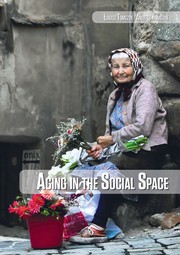
Aging in the Social Space
By Andrzej Klimczuk, Łukasz Tomczyk
Subjects: opieka nad ludźmi starymi, social enclave, ludzie starsi, ludzie starzy, border regions, lifestyle, zatrudnienie osób w wieku poprodukcyjnym, local development, poverty enclave, employment of retirees, development strategy, pension age, Discrimination in employment, solidarność pokoleń, polityka społeczna, strategia rozwoju, social infrastructure, gerontechnology, ageism, kapitał ludzki, social diversity, socjologia ekonomiczna, socjologia starości, aktywne starzenie się, ubóstwo, age-friendly city, zarządzanie strategiczne, older people, ageing, nonprofit institutions, kooperacja, kapitał kulturowy, starość, silver economy, care elderly, socjologia pogranicza, employment of persons in retirement age, solidarity of generations, infrastruktura społeczna, social exclusion, kapitał społeczny, social classes, human capital, cultural capital, social activity, lonely people, silver market, gerontology, klasy społeczne, third age, economic activity, bezpieczeństwo socjalne, białystok (woj. podlaskie), instytucje nonprofit, opieka społeczna, zaufanie, strategic management, miasto pogranicza, nursing home, gerontechnologia, marginalizacja społeczna, wiek emerytalny, poverty, styl życia, non-governmental organizations, trzeci wiek, starzenie się, zatrudnienie emerytów, active ageing, social capital, rozwój lokalny, trust, dyskryminacja z powodu wieku, old age policy, social policy, aktywność zawodowa, dyskryminacja ze względu na wiek, miasto przyjazne starszemu wiekowi, socjologia miasta, solidarność międzypokoleniowa, elderly, social welfare, old age, nierówności społeczne, zróżnicowanie społeczne, starsi pracownicy, przestrzeń społeczna, dom pomocy społecznej, university of the third age, aktywność ekonomiczna, strategic planning, sociology of borderland, aktywność społeczna, srebrny rynek, economic sociology, bezpieczeństwo społeczne, peripheral regions, enklawa społeczna, sociology of ageing, social marginalization, kultura ubóstwa, dyskryminacja w zatrudnieniu, dewiacje społeczne, professional activity, gerontologia, social space, uniwersytet trzeciego wieku, age discrimination, older workers, enklawy ubóstwa, social deviance, culture of poverty, cooperation, regiony przygraniczne, borderland city, planowanie strategiczne, srebrna gospodarka, social inequality, organizacje pozarządowe, Bialystok (Podlasie Voivodship), państwo dobrobytu, osoby samotne, old people, welfare state, sociology of the city, polityka starości, regiony peryferyjne, wykluczenie społeczne, social security
Description: A publication called Aging in the Social Space is a compilation of studies, which deal with theoretical understanding and empirical solutions, learning about problem spheres, specifying content parallels of social, legal, economic, moral and ethical views on senior issues in society, which are closely related to each other and are interconnected. This publication focus on the case study of Poland. It is supposed to provide a multidimensional view of old age issues and issues related to aging and care for old people in society. We believe that it is natural also to name individual spheres, in which society has some eff ect, either direct or indirect, within issues concerning seniors. Learning about these spheres is the primary prerequisite for successful use of social help to seniors in society. "The work elaborates a very important topic of our time, this is of an aging population, which many countries with their established social, political, legislative, health and other systems are not prepared for. The authors compared the global data on the aging of the population with information relating to the aging of the population in Poland. This publication consists of two large chapters with subheadings. In the first part the authors describe the elderly in social area and in the second part of a social policy relating to older people. The first part explains the different concepts and presents a new paradigm, which refers to the phenomenon of active aging. The second part presents the analysis of the aging population in selected major cities and presents documents and strategies necessary for further development of the quality of life of elderly people. The case studies technique enables the authors the identification of a number of factors and in-depth analysis of researched topics for each city. Theoretical bases complement to the research findings of other authors and adds their findings." Doc. dr Bojana Filej, the Alma Mater Europaea – European Center, Maribor, Slovenia "The publication, in my humble opinion, can be dedicated primarily to researchers of social gerontology topics, primarily students from the humanities and social sciences. Given the systematic increase in the number of people from abroad studying in Poland (including the Erasmus program) this book can also be used as teaching material to courses on subjects such as: geragogics, social gerontology, social pedagogy and sociology ." Prof. dr hab. Jan Maciejewski, the University of Wrocław, Poland
Comments
You must log in to leave comments.